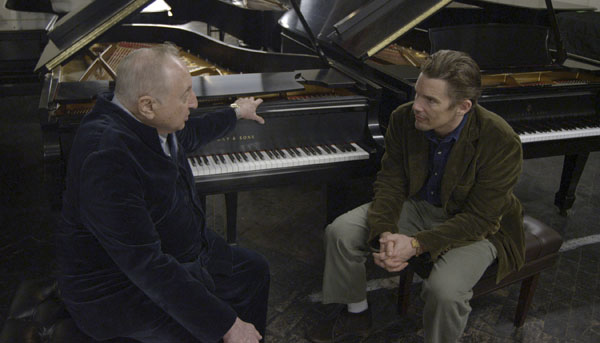![]() Proving that not all music teachers are of the terrifyingly mean J.K. Simmons variety, this moving, intimate documentary portrait tells of the life and passion of Manhattan concert pianist Seymour Bernstein. One often thinks of master artists as tortured geniuses, living neurotic, destructive lives to achieve artistic greatness. Bernstein, though, is a resounding example of how complete dedication to artistic excellence can give one a fulfilled, kind, eternally youthful soul.
Proving that not all music teachers are of the terrifyingly mean J.K. Simmons variety, this moving, intimate documentary portrait tells of the life and passion of Manhattan concert pianist Seymour Bernstein. One often thinks of master artists as tortured geniuses, living neurotic, destructive lives to achieve artistic greatness. Bernstein, though, is a resounding example of how complete dedication to artistic excellence can give one a fulfilled, kind, eternally youthful soul.
“Who do you know who has lived in the same one bedroom apartment for 57 years?” Bernstein asks his friend and the film’s director, Ethan Hawke. “A monk?” Hawke replies. That is a pretty good way of describing Bernstein, although in place of religion, Bernstein has music. We don’t meet many friends of his in the traditional sense of buddies—current or former pupils and colleagues populate the film. Neither is there any mention of a family or love life, but that shouldn’t be too surprising. Socrates said that true philosophers could not be married or have close relationships, since so much of their life is taken up with passionate thought. Bernstein’s life seems so utterly full that it would be absurd to imagine him having a family life and the commitments that brings with it.
Bernstein goes through life sharing his philosophies, though it may have been ratcheted up a bit when he knew he was being filmed. He believes that the essence of living lies in pursuing the limits of our talents, whatever they may be, and that so many people are bored or lost because they don’t realize that they have a need to be continuously creative.
Bernstein’s integrated life is unique among great artists, according to his friend Andrew Harvey, who remarks how the opera singer Maria Callas regarded herself as being two distinct entities. She was Maria with her friends when she had her artistic intensity dialed down, and she was Callas when she was in the throes of creativity. Bernstein is equally a friend and an imperiously passionate artist, all at once, in every circumstance.
At the age of 50, after decades of traveling the world as a renowned pianist, Bernstein decided to give his last public concert. Some former pupils believe that great artists have a moral obligation to continue creating and performing for society. Bernstein, on the other hand, seems to think that art is a path to living a better life, rather than life being merely a venue through which art is expressed. Demanding so much of himself as a musician was affecting his life, since whenever he inevitably failed to meet his impossibly high standards, he felt like a failure as a person, not just as a musician. So he decided to pour his knowledge into the next generation of pianists.
Bernstein doesn’t so much teach pupils how to play piano, but rather how a person has to be in order to get as much out of it as possible. It’s a way of life, balancing rigorous discipline and technique with the emotions that the music is meant to convey. Sometimes his pupils are too passionate, while sometimes they aren’t driven enough, and knowing when that is the case requires a special kind of wisdom. There are several scenes where Bernstein gives lessons in a master class. He offers private lessons, too, but the workshops are really something. Even in retirement, Seymour has found a way to perform through teaching.
Hawke manages to take himself out of the equation for the majority of the film, only popping up a few times to ask Seymour for counsel. It’s admirable how raw and insecure he allows himself to come across, not concealing his obvious crisis of confidence. He seems genuinely shaken by the prospect of the “second half of his life” staring him in the face, and he wants something truly authentic to stand upon to make the most of those years, as Bernstein has done.
Hawke is distrustful of financial motivations and skeptical of the promise of acting challenges. He wants something more. He wants what Bernstein has. The teacher doesn’t give him any real answers, and Hawke ends the film seeming as existentially adrift as ever. But with Seymour: An Introduction, he has created a film that will inspire people for generations to come.







Leave A Comment